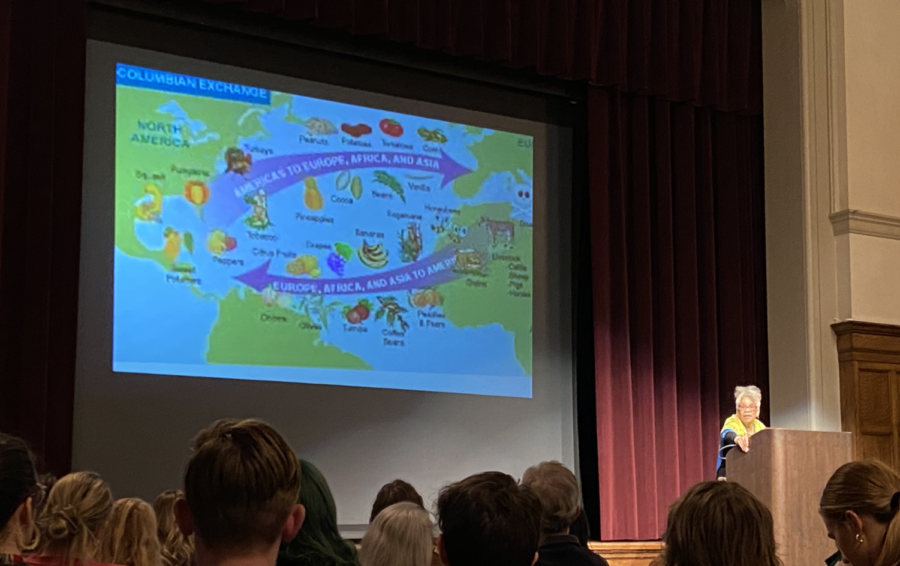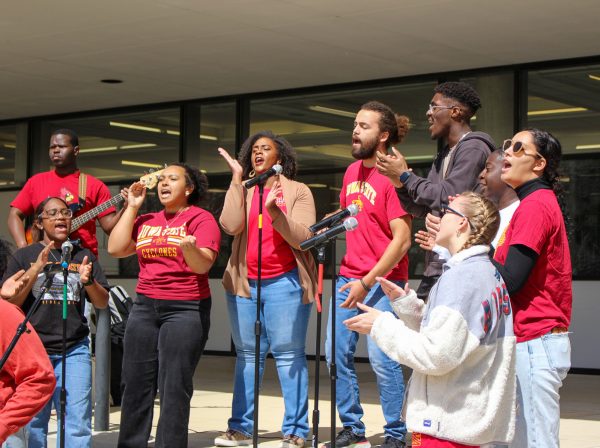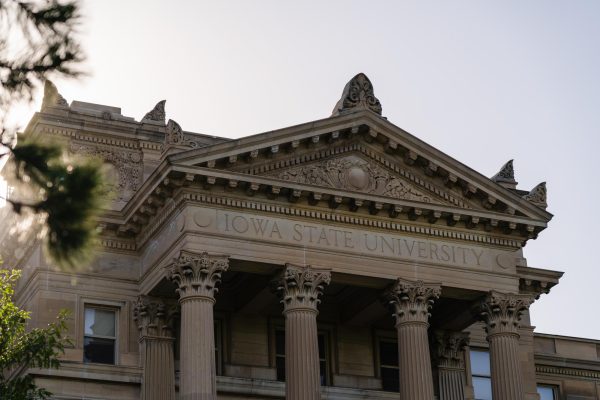Award-winning author discusses slave trade’s impacts on African American cuisine
Jessica Harris discusses how African American cuisine is impacted by traditions across the globe due to the transatlantic slave trade.
Culinary historian and New York Times bestselling author Jessica Harris shared the history of African American cuisine and how it transformed the United States Monday night.
The lecture, held in the Great Hall of the Memorial Union, featured a speech from Dr. Harris accompanied by questions from the audience and a book signing. Starting at 6 p.m., more than 80 students, faculty and Ames community members were in attendance.
Harris’ award-winning book, “High on the Hog: A Culinary Journey from Africa to America,” is the basis of the hit Netflix show by the same name.
“High on the Hog” discusses the history of African cuisine within America, which begins with the transatlantic slave trade, when millions of Africans were shipped across the Atlantic over the span of 400 years, according to the United Nations.
“When speaking of the history of Africans in the diaspora in this hemisphere, the history is also on the plate,” Harris said, “but it is a plate that speaks of divisions and interruptions.”
It is impossible to speak of the food of this hemisphere without talking about the transatlantic slave trade, which brought that sea change on those Africans who were forcibly removed from their motherland, according to Harris.
“The African American connection to watermelon originates on the African continent,” Harris said, “but for laborers in the hot sun during the period of enslavement, watermelon was useful and necessary to replace nutrients and quench thirst.”
Harris said it is likely that the mixed meats of feijoada come from enslaved individuals in different households. They brought different ingredients that were leftovers from their respective masters’ tables to create a shared meal.
“The Brazilian national dish that is a mixed meat stew with black beans, white rice and shredded kale, called feijoada, tells the story of the colonization of that country,” Harris said, “and equally, with its mixed meats, perhaps the story of enslavement and shared meals.”
From couscous in Morocco that is tied to millet couscous in Mali, African American cuisine is intertwined and embedded with ingredients and culinary traditions from across the globe.
“Soul food stems from shared meals,” Harris said. “However, soul food is not monolithic; it is simply one facet of African American foods.”
The food within a common African American plate consists of cornbread, chicken, collard greens, mac and cheese and black-eyed peas, all of which are found within Africa, according to Harris.
“The African American plate is characterized by a general taste for the well-seasoned,” Harris said. “This is different from the spicy hot, as traditional seasonings are usually simple things like salt and pepper with the addition of garlic, onion, bell peppers and celery, but this bite usually comes from chilies and hot sauces.”
Harris left the audience with parting words about the connection between the African continent and the foods of the United States.
“Remember whether it is a slice of watermelon or a plate of fried chicken or a pot of gumbo,” Harris said, “the history of the foods of the United States are strong, and the history of African Americans is on the plate.”
For many audience members, this event was a new way to learn about culinary history and traditional practices.
“One main thing I learned was the Columbian Exchange and how these ingredients came across the ocean and are still so relevant to modern dishes,” said Tanner Coenen, a sophomore in culinary food and human sciences.
Others learned the impact of the transatlantic slave trade on African American cuisine and the connections to modern dishes.
“Just making the connections,” said Samuel Bowen, a junior in culinary food science and agriculture, “To see how you get the food that they would have traditionally and how they transform it into a different type of food.”
Bowen said it was also interesting to hear how less valuable and leftover parts of foods, such as pig chitlins, were turned into dishes.
“The biggest thing is that this isn’t far away from us,” Coenen said. “Even though we’re in the Midwest and many African American dishes are associated with the South, it’s something that’s close to us, and we should talk about it.”
Your donation will support the student journalists of the Iowa State Daily. Your contribution will allow us to purchase equipment, send our student journalists to conferences and off-set their cost of living so they can continue to do best-in-the-nation work at the Iowa State Daily.












